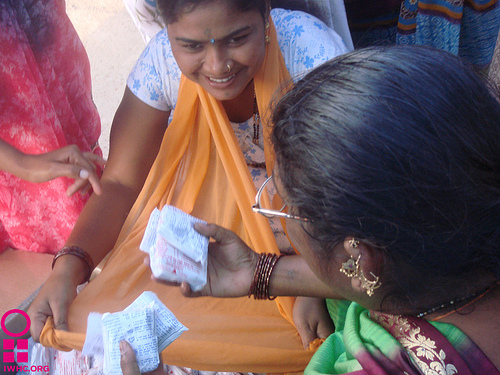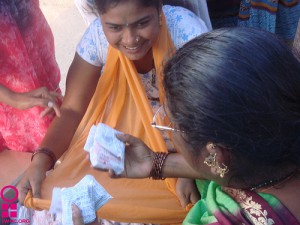
A gradual process of inclusion; engaging and understanding exclusion
In 1992, health and human rights NGO, SANGRAM, recognised the need to do something about the rapid spread of HIV and AIDS in the rural districts of western Maharashtra and north Karnataka. With the looming fear that entire populations might be wiped out, Government and policy makers focussed on women in sex work as a crucial group to ‘target’ to prevent transmission to ‘save’ the general population. In Sangli, Maharashtra, sex workers began asking questions—not only as to why only they were being targeted but also about the marked lack of concern about their own health and safety. SANGRAM responded to these questions by starting a peer-based programme with women in sex work from the ground up. Soon after, this became the independent collective of women in sex work, VAMP (Veshya Anyay Mukti Parishad), and, organically, other projects emerged in confluence.
Women in sex work from VAMP urged SANGRAM to work with married women, adolescents and young men in the rural district. As women interacting with different men on a daily basis—young, old, single and married from all over the district, and from every community—they saw that the targeted intervention approach was very limited and the wider population was unaware of HIV, and felt they should be informed and educated. This realisation led to starting a district campaign against HIV, which began in 1997. The campaign addresses HIV and AIDS through a comprehensive strategy of prevention, access to treatment, care and support. The strategy covers the full continuum of the epidemic—before, during and after. A harm reduction campaign on violence against women and responsible safe sex among youth in Sangli district emerged and now SANGRAM reaches sex workers and married women, clients, husbands and lovers, teenagers and truck drivers, migrants and men who have sex with men, orphans and widows, panchayat (village council) heads and policemen.
The multiplicity of injustice
Sex workers, men who have sex with men, transpeople and people living with HIV all experience varying types and differing degrees of social injustice because of endemic social intolerance of difference, and unbending social and religious morality. However, each group has its own problems arising from how they are regarded as ‘other’, and find their own ways and means of coping.

Women in sex work are regarded as ‘immoral’ because they have multiple sexual partners and because they earn money through sex. By doing this, they break with the norm of sex within marriage, sex for love, and sex for reproduction. A key issue facing female sex workers is to overcome the internalised sense of shame about what they do. Feminism and rights have provided a platform for sex workers at SANGRAM to re-evaluate what they do and understand it as business, rather than as something inherently ‘wrong’. Advocating that sex work is work, VAMP has become better organised and has established safer working conditions.
Sex between men is perceived as unnatural. Males who have sex with males (MSM) struggle with a similar internalised shame, which is to do with the social pressure to perform a particular type of masculinity. MSM at SANGRAM work to help families accept their own and to care for men who have lost the support of their families. MUSKAN, the collective of males and transpersons, is a collective of MSM, males in sex work (MSW) and transpeople some of whom are in sex work and some who are not in sex work. The commonality of being deemed biologically male binds them together.
Unlike females in sex work, MSM in this rural district are less exposed to the rights discourse, and those who earn money through sex do so under extremely disorganised working conditions. They are highly vulnerable to violence and HIV as a result. A key issue for males in sex work is creating safe spaces for sex work and intimate relationships.
HIV-positive people have to deal with the assumption that they became infected through immoral action i.e. having multiple sexual partners or ‘unnatural’ sex. They have life-threatening health issues but are prevented from attending to these by stigma and prejudice. Their key concern is securing access to medical facilities and treatment.
—
Rural women lack access to medical and legal resources because they live in rural areas. In addition, a rigid patriarchal system operates in the villages, requiring women to demonstrate ‘good’ sexual morality. Because their respectability resides in being married and conforming to the family/wife expectations, this often forces women to stay with violent husbands. Rural women need access to support and unbiased systems of justice.
SANGRAM also found that adolescents and young adults want to discuss issues around sex and sexuality openly and thus was born the ‘Campaign for Responsible Safe Sex’. Young people need to understand issues related to sexuality, develop appropriate attitudes towards sex and gender roles, and understand the importance of responsible sexual behaviour.
The issue is complicated by the fact that most policies design programmes for rural women, adolescents and young adults as distinct from sex workers, men who have sex with men, transpeople and people living with HIV. The difference in SANGRAM is that we look for them in all the communities we work with. We look for the sex worker in the non-sex worker community and the ‘young mother’, the adolescent, the young adult, the domestic violence perpetrator and the victim in the sex worker community, among transpersons and the sexual minority community.
To read more about SANGRAM’s work in Sangli, keep a lookout for part two on the 15th of this month.